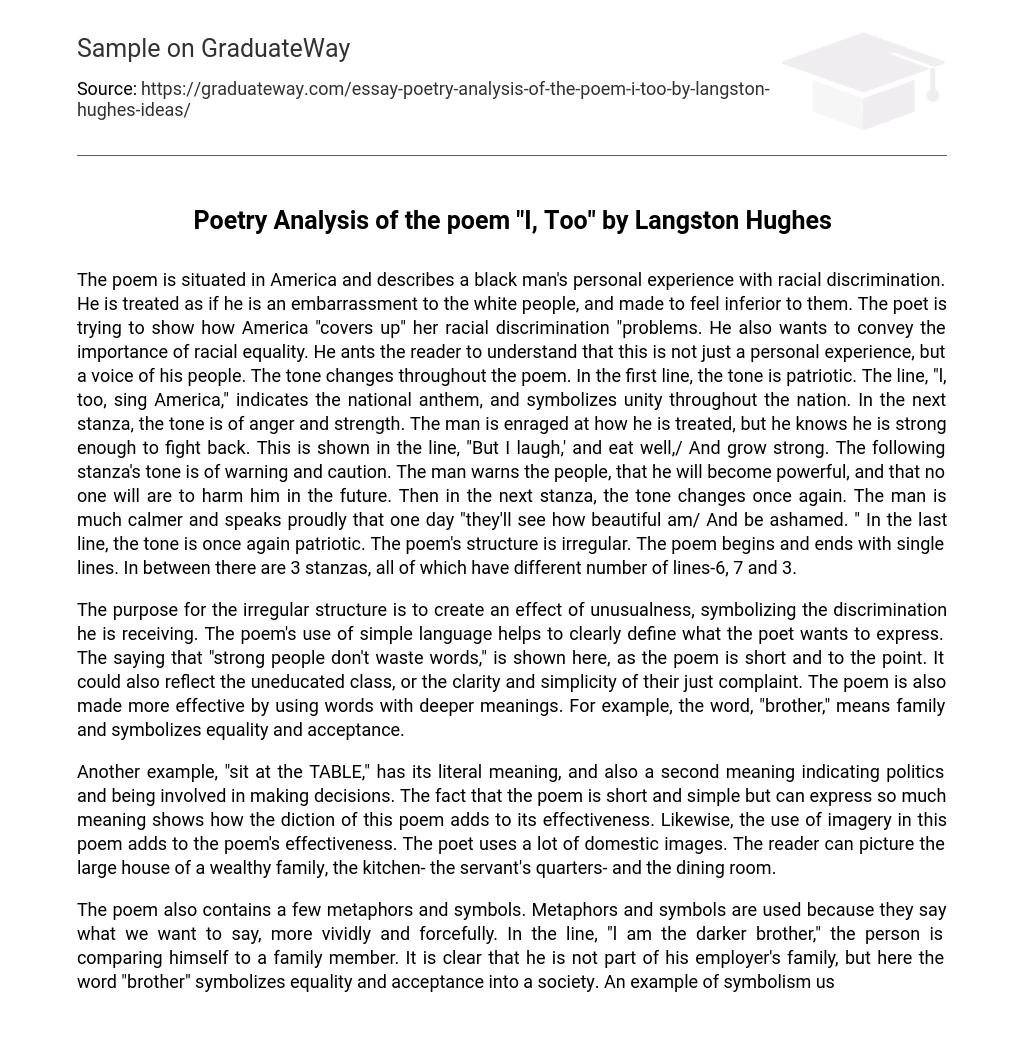The poem takes place in America and tells the story of a black man facing racial discrimination. He is treated as if he is a source of shame for white people and is made to feel inferior. The poet aims to expose how America hides its racial discrimination issues while highlighting the importance of racial equality. The poet wants the reader to understand that this is not just one person’s experience, but the voice of an entire group of people. The tone of the poem changes throughout. In the first line, it is patriotic, referencing the national anthem and symbolizing unity. In the next stanza, the tone becomes angry and strong as the man expresses his rage at how he is treated but also asserts his own strength. The following stanza adopts a tone of warning and caution as the man declares that he will become powerful and untouchable in the future. The tone shifts once more in the next stanza, with the man speaking calmly and proudly, stating that one day people will recognize his beauty and feel ashamed. The last line returns to a patriotic tone. The structure of the poem is irregular, starting and ending with single lines and featuring three stanzas of varying lengths – 6, 7, and 3 lines each.
The purpose for the irregular structure is to create an effect of unusualness, symbolizing the discrimination he is receiving. The use of simple language in the poem helps to clearly define what the poet wants to express. This relates to the saying that “strong people don’t waste words,” as the poem is short and concise. It could also reflect the uneducated class or the clarity and simplicity of their just complaint. Additionally, the poem becomes more impactful by incorporating words with deeper meanings. For instance, the word “brother” signifies family and represents equality and acceptance.
Yet another example of the poem’s effectiveness lies in its use of diction, specifically the phrase “sit at the TABLE.” This phrase not only carries its literal meaning, but also conveys a deeper implication of politics and involvement in decision-making. This demonstrates how the poem’s concise and simplistic structure can still convey significant meaning. Additionally, the poem’s effectiveness is enhanced through its use of imagery, particularly through the portrayal of domestic scenes. Through these vivid descriptions, the reader is able to visualize the opulent home of an affluent family, complete with a spacious kitchen – where the servants reside – and an elegant dining room.
The poem incorporates metaphors and symbols to convey its message in a more dynamic and impactful manner. In the line, “I am the darker brother,” the narrator compares himself to a relative, signifying his desire for equality and inclusion in society. A symbol is also employed in the line, “They send me to eat in the kitchen when company comes,” which carries dual meanings.
The poem effectively uses comparisons and symbols to convey two meanings. One meaning is literal, where employers send someone away when guests arrive. The other meaning symbolizes America’s attempt to hide her racial “problems” and present a different image to the world. Another example is the phrase “I’ll sit at the TABLE,” which can be interpreted literally as sitting at a table, but also symbolizes being in charge and making decisions. These comparisons and symbols enhance the effectiveness of the poem, which is written in an irregular rhythm for added impact.
The poet intended for the poem to have a solemn feeling, so they avoided using a steady rhythm which would have made it sound like life was going smoothly. Instead, the irregular rhythm reflects the uneasy and unsteady social relationship between blacks and whites in America. The poem also includes some instances of alliteration and repetition, such as the line “When company comes,” where the consonant “c” is repeated twice, drawing attention to the word “company.”
The poem emphasizes the theme of America’s attempt to hide its racial issues and present a false image. It also highlights discrimination through the unjust treatment of a man, illustrating the unequal distribution of privileges and decision-making power in society. Despite this, the poem also offers hope through the man’s strength and bravery, suggesting a future where equality exists for all. The poet’s vivid imagery and use of sound effectively convey its anti-discrimination message.





